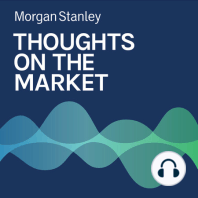3 min listen

U.S. Public Policy: The Impact of Student Loan Forgiveness
U.S. Public Policy: The Impact of Student Loan Forgiveness
ratings:
Length:
7 minutes
Released:
Sep 15, 2022
Format:
Podcast episode
Description
The White House recently announced a student loan forgiveness program, prompting questions about implementation, economic implications, and whether the program will have an impact on consumer spending. Sarah Wolfe of the U.S. Economics team and Arianna Salvatore of the U.S. Public Policy team discuss.----- Transcript -----Sarah Wolfe: Welcome to Thoughts on the Market. I'm Sarah Wolfe from Morgan Stanley's U.S. Economics Team. Ariana Salvatore: And I'm Ariana Salvatore from Morgan Stanley's U.S. Public Policy Research Team. Sarah Wolfe: And on this episode of the podcast, we'll focus on student loans, in particular the recent student loan forgiveness program, and we'll dig into the impact on consumers and the economy. It's Thursday, September 15th, at 12 p.m. in New York. Sarah Wolfe: So, Ariana, the White House recently announced plans to forgive individuals up to $20,000 in federal student loans and extend the moratorium on interest payments. However, there was some confusion earlier in the year as both President Biden and Speaker Pelosi expressed doubts about the president's authority to cancel student debt. So is this something that requires an act of Congress, or can the president really do it alone? Ariana Salvatore: As you mentioned, prior to the announcement, there was some unresolved questions out there surrounding the legality of canceling student debt. In revealing the program, the administration cited authority from a 2003 law called the 'Heroes Act' that gives the executive the power to reduce or eliminate student debt during a national emergency, “when significant actions with potentially far reaching consequences are often required”. That being said, don't expect it to go over quietly. Reporting indicates that some Republican attorneys general are looking to bring legal challenges to the plan, which could present a risk to execution. But let's put questions about implementation aside for a second. What does reduced student debt impact more, longer term planning or immediate spending? And how do you quantify the impact on consumer spending? Sarah Wolfe: Thanks, Ariana. I'd like to just take a step back for a second before I talk about the economic impact, just so we could size up the program a bit. We estimate that there's going to be $330 to $390 billion in debt directly forgiven as part of this program. However, we estimate that the fiscal multiplier is actually quite small. So every dollar of debt that's forgiven that's going to get spent and put back into the economy, is really estimated at only 0.1. This is really small when you consider the fiscal multiplier of the COVID stimulus programs. So for example, the stimulus checks, supplemental unemployment benefits, that had a fiscal multiplier of 0.5 to 0.9. So it was much larger. The reason for this is because our survey work shows that people who have their student debt forgiven don't actually change their immediate spending patterns. Instead, it really impacts longer term planning. We're talking about paying down other debts, planning for retirement, perhaps buying a house or having a child earlier, and so there's not really an immediate spending impact on the economy. What does have a larger fiscal multiplier is forbearance coming to an end. Prior to COVID, people were on average paying $260 a month in student loan payments. That's been on hold for two and a half years. So when that resumes again in January, it's likely going to be less than $260 a month because of the loan forgiveness and other measures passed by the White House to limit loan payments per month. However, that's an immediate impact to discretionary income, and as a result, we're going to see a lot of households adjust their spending in the near term to make these new loan payments. Arianna, speaking of student loan forbearance, which I mentioned is set to end at the end of this year after a number of extensions, the White House is hoping that forgiveness is going to kick in right when forbe
Released:
Sep 15, 2022
Format:
Podcast episode
Titles in the series (100)
Andrew Sheets: For Markets, Signs, Signs, Everywhere Signs by Thoughts on the Market